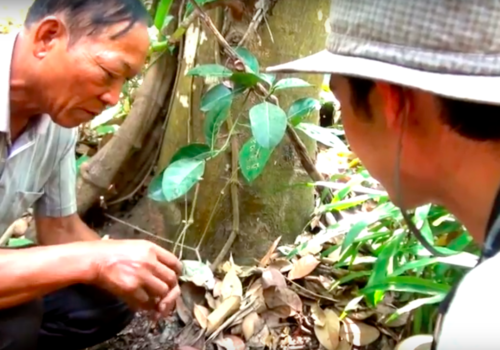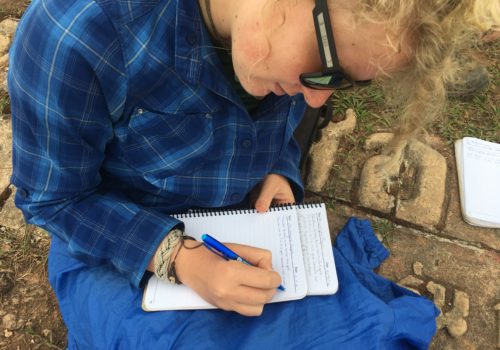
Lydia learning about giant kelp in Monterey Bay. No question THIS learning is fun!
Fun.
Somehow we seem to think that learning should only be fun if you are in kindergarten, and if it is “fun” it is somehow suspect if you’re in college or university. When we’ve got a new group of students at ISDSI we talk about their expectations for the experiential learning courses. Lots of words and phrases come up (“challenge” or “adventure” or “academic”), but “fun” is often one of the last ones mentioned, if it is mentioned at all. When it is mentioned, at first there is often a lot of hesitation, like it is somehow bad that they hope the courses will be fun. Once we talk about how we hope the courses will be fun, everyone opens up and we usually have a great discussion about “fun” and learning.
When we’re little kids (like the photo here of Lydia at 6 years old on a trip to California) we play all the time. We’re not old enough to be embarrassed, or think we have to be “serious” for it to be “real” learning. For kids, learning and fun are so intertwined there’s no distinction.
Bisson and Luckner, in Fun in Learning: The Pedagogical Role of Fun in Adventure Education argue that “[t]he characteristics of fun are that it is relative, situational, voluntary, and natural. Fun can have a positive effect on the learning process by inviting intrinsic motivation, suspending one’s social inhibitions, reducing stress, and creating a state of relaxed alertness.”
Especially when teaching about ecology and culture, learning needs to be immersive and fun. Play is a hugely important part of learning when we are young, and it can be (if we let it) be an important part of learning for adults as well.
We’ve noticed that almost without exception, students who are willing to have fun, play, and explore learn more. When you play in the surf, you are learning with your whole body about waves and the power of the ocean. Chasing crabs around on a beach at night, trying to follow a particular fish on a reef (“playing tag”), all of that is useful. You learn with your whole body — smelling, touching, tasting and feeling. Sea kayaking isn’t just fun — it is a powerful learning experience about tides, waves, currents and wind. Getting caught (and pushed) in a strong current when crossing a channel “sets” in the learning in a way that cannot be duplicated in the classroom. And it is fun and challenging all at the same time.
Especially on courses that are physically, emotionally and academically difficult, having fun can be critical to learning. Sometimes the best learning happens when the courses are the hardest work and the most fun.



